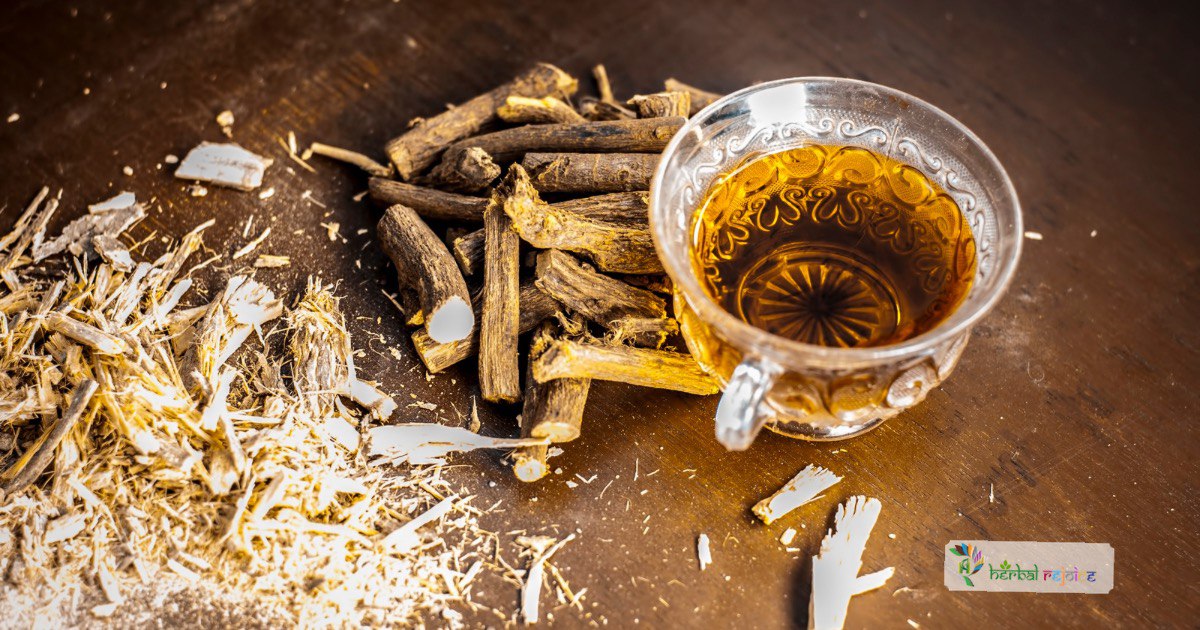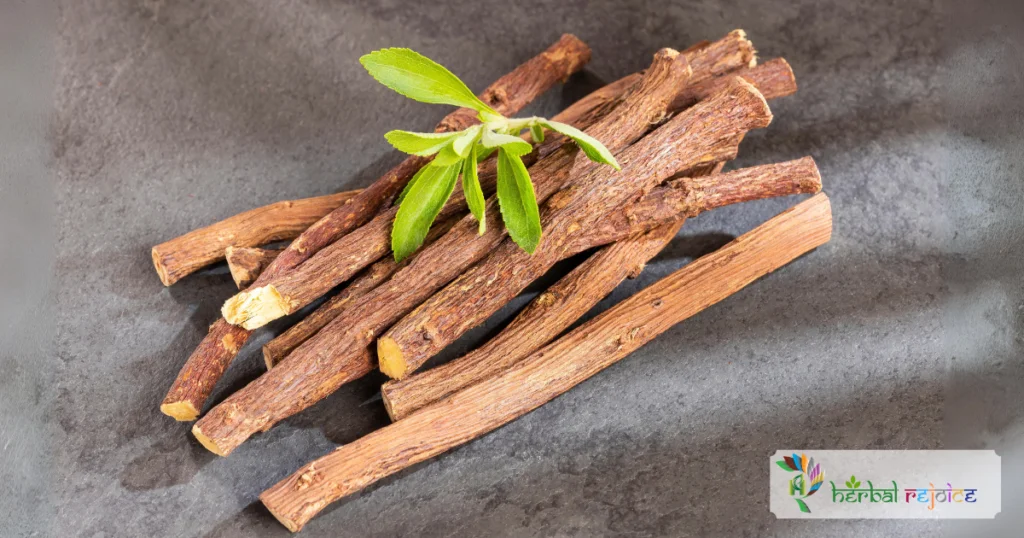Introduction To Licorice
Glycyrrhiza glabra Linn, commonly known as Licorice or Liquorice, is a versatile plant belonging to the Papilionaceae/Fabaceae family.
Native to the Mediterranean regions, this remarkable herb is now cultivated in various parts of India, including Punjab, Jammu and Kashmir, and South India.
In this article, we will explore the traditional uses and health benefits of Glycyrrhiza glabra. Known as Yashtimadhu, Madhuyashtyaahvaa, and Mulethi in different traditional medicine systems, this extraordinary herb offers a plethora of therapeutic properties. Join us as we delve into the remarkable qualities of Glycyrrhiza glabra.
Habitat and Names
Glycyrrhiza glabra can be found in its native habitat of the Mediterranean regions. It is now cultivated in various regions of India.
English Names: Licorice, Liquorice
Ayurvedic Names: Yashtimadhu, Madhuyashtyaahvaa, Madhuli, Madhuyashtikaa, Atirasaa, Madhurasaa, Madhuka, Yastikaahva, Yashtyaahva, Yashti, Yashtika, Yashtimadhuka, Klitaka
Unani Names: Asl-us-soos, Mulethi, Rubb-us-soos
Siddha/Tamil Name: Athimathuram
Traditional Uses and Medicinal Benefits Of Licorice
Glycyrrhiza glabra has a rich history of traditional use for various ailments.
1. Respiratory Support:
Licorice is known for its demulcent, expectorant, and anti-inflammatory properties. It has been traditionally used to provide relief from bronchitis, dry cough, respiratory infections, and catarrh.
2. Digestive Health:
Licorice exhibits antispasmodic, mild laxative, and antiulcer properties. It has been employed to alleviate abdominal pain, gastric and duodenal ulcers, inflamed stomach, and mouth ulcers. Licorice is also used for its hepatoprotective effects.
3. Hormonal Support:
Licorice has been traditionally used for its estrogenic and emmenagogue properties, making it beneficial for managing hormonal imbalances and promoting normal menstrual cycles.
4. Anti-Inflammatory and Antiallergic Effects:
Licorice is valued for its anti-inflammatory and antiallergic properties. It has been used to reduce inflammation and alleviate symptoms of allergies.
5. Stress Management and Antidepressive Effects:
Licorice is known for its antistress and antidepressive properties. It has traditionally been used to provide relief from stress-related symptoms and support emotional well-being.
Key Components and Preparation Of Licorice
Glycyrrhiza glabra contains various components that contribute to its medicinal properties.
1. Glycyrrhizin:
The main chemical constituent of licorice is glycyrrhizin, a triterpene saponin. It is present in the root and is responsible for many of the herb’s medicinal effects. Licorice also contains glycyrrhetinic acid, the aglycone of glycyrrhizin.
2. Other Active Constituents:
Licorice contains isoflavonoids, chalcones, coumarins, triterpenoids and sterols, lignans, amino acids, amines, gums, and volatile oils. These components contribute to the diverse therapeutic properties of the herb.

Precautions and Usage Of Licorice
While Licorice shows potential health benefits, it is important to exercise caution and seek professional advice.
Licorice can cause fluid retention and may lead to hypokalemia if used in high amounts for prolonged periods. It is advisable to follow a high potassium and low sodium diet while using licorice preparations.
Special precautions should be taken for elderly patients, as well as patients with hypertension, cardiac, renal, or hepatic diseases. Additionally, it is important to consult healthcare professionals for personalized advice and to consider individual dietary needs.
Conclusion:
Glycyrrhiza glabra, also known as Licorice or Liquorice, offers a vast array of health benefits. From its role in respiratory support and digestive health to its hormonal balancing and stress management properties, this versatile herb has been utilized for centuries in various traditional medicine systems.
With its rich chemical composition, including glycyrrhizin and other active constituents, Glycyrrhiza glabra provides a natural and holistic approach to wellness.
However, it is crucial to exercise caution, follow proper dosage guidelines, before incorporating licorice into your healthcare routine.
Embrace the potential of Glycyrrhiza glabra and explore the various ways to benefit from this extraordinary herb for enhanced health and well-being.
Frequently Asked Questions (FAQs):
What is the botanical name of Licorice?
The botanical name of Licorice is Glycyrrhiza glabra Linn.
Where is Licorice native to?
Licorice is native to the Mediterranean regions.
What traditional medicinal uses does Licorice have?
Licorice has been traditionally used for respiratory support, digestive health, hormonal support, anti-inflammatory effects, and stress management, among others.
Can Licorice help with bronchitis and respiratory infections?
Yes, Licorice is known for its demulcent, expectorant, and anti-inflammatory properties, providing relief from bronchitis, dry cough, respiratory infections, and catarrh.
Does Licorice have benefits for digestive health?
Yes, Licorice exhibits antispasmodic, mild laxative, and antiulcer properties, making it beneficial for alleviating abdominal pain, gastric and duodenal ulcers, and inflamed stomach, among others.
Can Licorice be used for hormonal imbalances?
Yes, Licorice has estrogenic and emmenagogue properties, making it helpful for managing hormonal imbalances and promoting normal menstrual cycles.
Is Licorice effective for reducing inflammation and allergies?
Yes, Licorice is valued for its anti-inflammatory and antiallergic properties, aiding in reducing inflammation and alleviating allergy symptoms.
Can Licorice be used for stress management and emotional well-being?
Yes, Licorice is known for its antistress and antidepressive properties, providing relief from stress-related symptoms and supporting emotional well-being.
What is the key component found in Licorice?
The main chemical constituent of Licorice is glycyrrhizin, a triterpene saponin, which is responsible for many of its medicinal effects.
Are there any precautions to consider when using Licorice?
Yes, Licorice can cause fluid retention and may lead to hypokalemia if used in high amounts for prolonged periods. It is advisable to follow a high potassium and low sodium diet while using Licorice preparations.
Can Licorice interact with medications?
Licorice may interact with certain medications, particularly those that affect potassium levels, blood pressure, or hormonal balance.
Can Licorice be used during pregnancy or breastfeeding?
It is recommended to consult healthcare professionals before using Licorice during pregnancy or breastfeeding, as there may be potential risks.
Can Licorice be used for skin conditions?
Licorice’s effects on skin conditions have not been extensively studied. Consult healthcare professionals for appropriate management of skin conditions.
Can Licorice be used for diabetes?
Licorice’s effects on diabetes management have not been extensively studied.
Can Licorice be used for weight loss?
Licorice’s effects on weight loss have not been extensively studied.
Can Licorice be used for liver health?
Licorice’s effects on liver health have not been extensively studied for appropriate management of liver health.
Can Licorice be used for fertility support?
Licorice’s effects on fertility have not been extensively studied for appropriate fertility support options.
Can Licorice be used for heart health?
Licorice’s effects on heart health have not been extensively studied for appropriate management of heart health.
Can Licorice be grown in home gardens?
Licorice can be challenging to grow in home gardens as it requires specific climate and soil conditions. Consultation with horticulture experts or nurseries is recommended.


